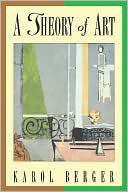

 |

|

The average rating for A Theory of Art based on 2 reviews is 4 stars.
Review # 1 was written on 2013-08-22 00:00:00 Frank Losasso Frank LosassoIncredible collection of poetic manifestoes! |
Review # 2 was written on 2014-07-01 00:00:00 Brian Danis Brian DanisI read this book - well most of it - while in graduate school at the University of Pittsburgh. This book had a pretty nice spot in my head and heart because I associated it with my first brush with "the other side" of rhetoric, composition & writing studies. I took a course on political poetry and thoroughly enjoyed it. It was a very sharp group, and the readings were all very deep and meaningful to me at the time. I re-read this book at the start of the summer to try to orient myself toward some work I'm doing on debate, which is traditionally taught as a part of speech communication. I feel that composition would do a much better job of teaching it, and while working through this idea, this book popped into my head. The re-reading held up for me, but a lot of the themes of the book do not hold up well in 2020 compared to 2005 when I first encountered it. Let's handle the weaknesses first: Bernstein is preoccupied with postmodernism. It bugs him, like an itch that won't go away, so he's constantly scratching it throughout the pages of the book. It's funny that what bugs him is the sort of direct oppositional binary that he works so hard to refute in terms of poetic composition/reception in the chapter "Artifice of Absorption" - and does so very well in my view. But postmodernism as something opposed to historical, knowable truths. . . well that opposition seems to be even easier to get out of, yet he tends to see the conflict as something that is frustrating to him and we'd be better off without it. The other part of the book that simply does not hold up is his essay on video games, which is a very surface, very confused account of the value and dangers of playing video games. The book was written in 1986, but even at that time he avoids discussing anything but the most basic shooters, not discussing Zork or Adventure, games that should figure prominently in any discussion of poetics. Messing around with the limits of the game has always been a part of gaming. I think it's a missed opportunity by him just because he thinks he's seen what video games are - and limits it to the Atari, and the stand up arcade machines of the 80s. But text-based gaming and Mudding was rising up and that has a lot of possibilities that Pac Man does not. The book is fantastic when it works though. Artifice of Absorption is one of the best things about composition and invention I've read. His chapter on the dangers of hyping Ezra Pound's work and how such evaluations rest on a fascism that exists within culture as a default hardly needs explanation to see how prescient it is. Reading his take down of Pound was as instructional as it was pleasurable, and done with exacting kindness - hardly passable for anti-fascist discourse in 2020 which is as blunt as it is useless. This essay might be a good one to assign to first-year students to give them some context for creating discourse against fascism that doesn't also include the ingredient of anti-intellectualism that we see so frequently today among well-meaning liberals. As a whole, it's a good read of Charles Bernstein's concerns and questions, and perhaps might give us some insight into why he writes his poems the way he does, or perhaps why we might not like them or really like them, or whatever. But I think that the Artifice & Absorption conversation is so important that its value makes the text worthwhile. That chapter can organize an entire course in composition - and hopefully one in debate or argumentation. I'd like to try. It was good to revisit this old familiar book and think back to being in seminar and encountering all the ideas of the compositionists for the first time. I was very confused by it all. But I'd rather that feeling again instead of what I feel now which is jealousy of how robust their thought and writing is about teaching rhetorical invention whereas my field isn't terribly interested in that at all. |
CAN'T FIND WHAT YOU'RE LOOKING FOR? CLICK HERE!!!